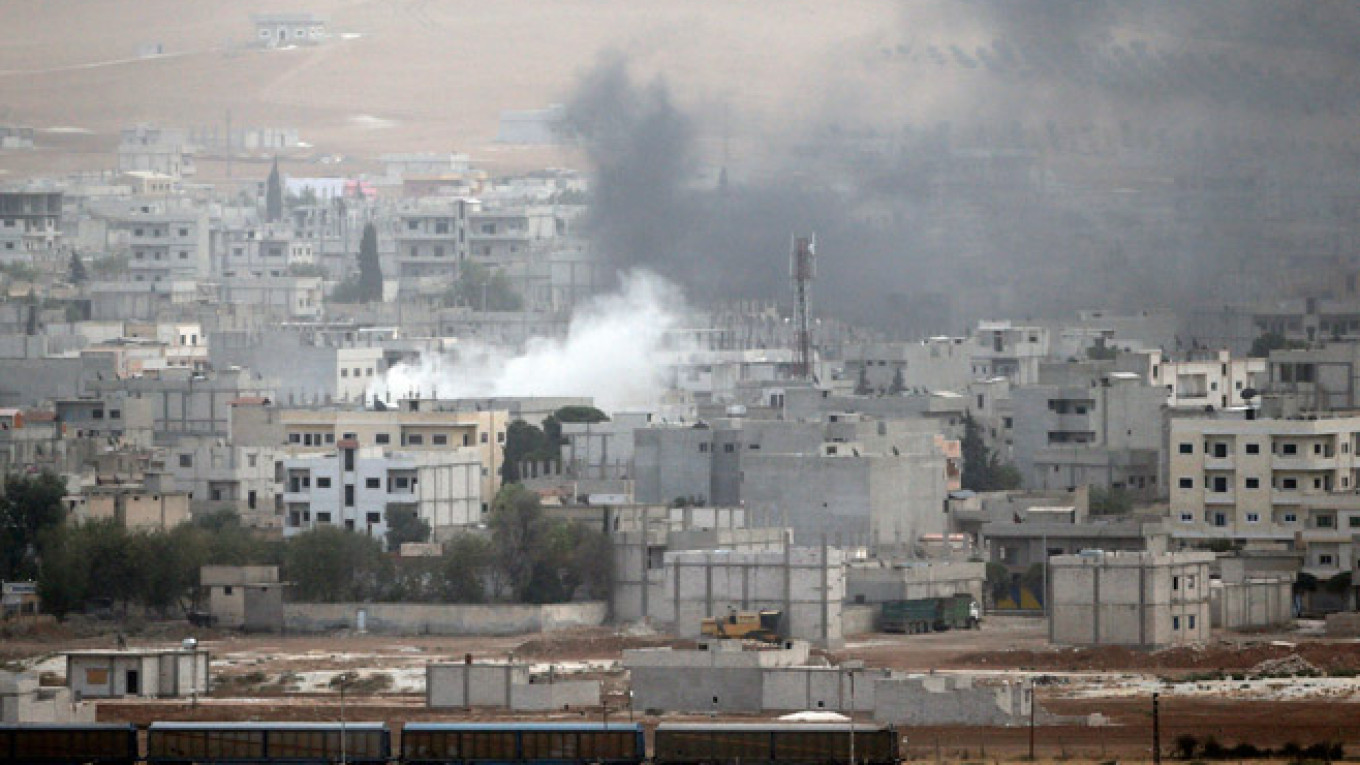Ever since atrocities of the Islamic State first came to light — the images of crucified bodies, footage of prisoners being shot in the back, the slayings of female human rights activists, the news of families being starved on a mountain, the beheadings of Western journalists and aid workers, the first reports of the ongoing bloody battle for the Syrian city of Kobane — one might wonder if, sitting in the safety of their homes, the analysts in Washington ever stopped to think that maybe, President Vladimir Putin was right about Syria.
Of course, the notion of the Russian president being right about anything is a tough one to swallow these days — let alone say out loud.
The notion of the Russian president being right about anything is a tough one to swallow these days — let alone say out loud.
Following the annexation of Crimea and the violent destabilization of the Donbass region of eastern Ukraine, Russia is not exactly the darling of the West.
Furthermore, it is not as if Russia's support of Syrian President Bashar Assad — who stands accused of everything from gassing his own people to authorizing executions of entire families — has not been self-serving and entirely in line with Russian interests in the region.
In recent years, the Kremlin has waged a petty little war of attrition against U.S. influence whenever and wherever it could, and the Middle East is no exception.
Generally, the Kremlin is allergic to outside regime change, in any country,? for mundane and basic reasons, along the lines of "if it [regime change] is possible in Syria, what's stopping anyone from trying it out in Russia?" Quite a lot, actually, but that's a story for another time.
Nevertheless, Russian logic on Syria has been sounder than American logic from the start.
American logic when dealing with Syria was steeped in the idealism of America's vision of itself — that of an enlightened, benevolent nation, brilliant enough to resolve any grim situation and tie up all loose ends with a pretty bow — one that the U.S. can afford to entertain due to its wealth and general security.
From its lofty position, the U.S. could easily take the high ground and argue for the unequivocal removal of someone as horrifying as Assad — surely, things could only get better with him either gone or substantially weakened.
Russia, by contrast, is a country that, as the saying goes, "has seen some sh--." Russia has experienced chaos and humiliation following regime change and has watched good ideas spin horribly out of control on its own soil in the past.
And Russia, therefore, has argued, over and over again, that Assad could not simply "go" as civil war raged in the country — for there was a distinct possibility that someone even worse would take advantage of the chaos and quickly fill that void.
Russia argued that it made more sense to deal with state actors, such as Assad, who are at least more predictable than non-state actors. And it was the Russians who, from the start, cautioned against idealistic visions of the various rebel groups in Syria, pointing out that some were downright extremist, or else had ties to extremists in the region.
The recent military victories of the Islamic State — a group that are mind-blowing in their nihilism and sadism and as efficient in their destruction as a plague of locusts — has proven Russia right.
Yet rigid, binary thinking on the Syrian conflict, the desire of the Western public for a neat little narrative of brave "good guys" fighting terrifying "bad guys," the rejection of the idea that war is a messy business where the best intentions can sometimes lead to terrifying consequences and the refusal to accept that identifying the "good guys and the "bad guys" is not always very clear-cut, means that it is unlikely that any lasting lessons will be drawn from all this.
After all, Libya has been sliding toward chaos for some time now. Putin was horrified at the way Libya's former dictator, Moammar Gadhafi, was put to death, and Putin warned of the possibility of further violent turmoil in the country.
No one cared then — and no one cares now.
Nuance, after all, is not politically expedient. And there is no glory in picking the lesser of two evils.
Natalia Antonova is an American playwright and journalist.
A Message from The Moscow Times:
Dear readers,
We are facing unprecedented challenges. Russia's Prosecutor General's Office has designated The Moscow Times as an "undesirable" organization, criminalizing our work and putting our staff at risk of prosecution. This follows our earlier unjust labeling as a "foreign agent."
These actions are direct attempts to silence independent journalism in Russia. The authorities claim our work "discredits the decisions of the Russian leadership." We see things differently: we strive to provide accurate, unbiased reporting on Russia.
We, the journalists of The Moscow Times, refuse to be silenced. But to continue our work, we need your help.
Your support, no matter how small, makes a world of difference. If you can, please support us monthly starting from just $2. It's quick to set up, and every contribution makes a significant impact.
By supporting The Moscow Times, you're defending open, independent journalism in the face of repression. Thank you for standing with us.
Remind me later.


